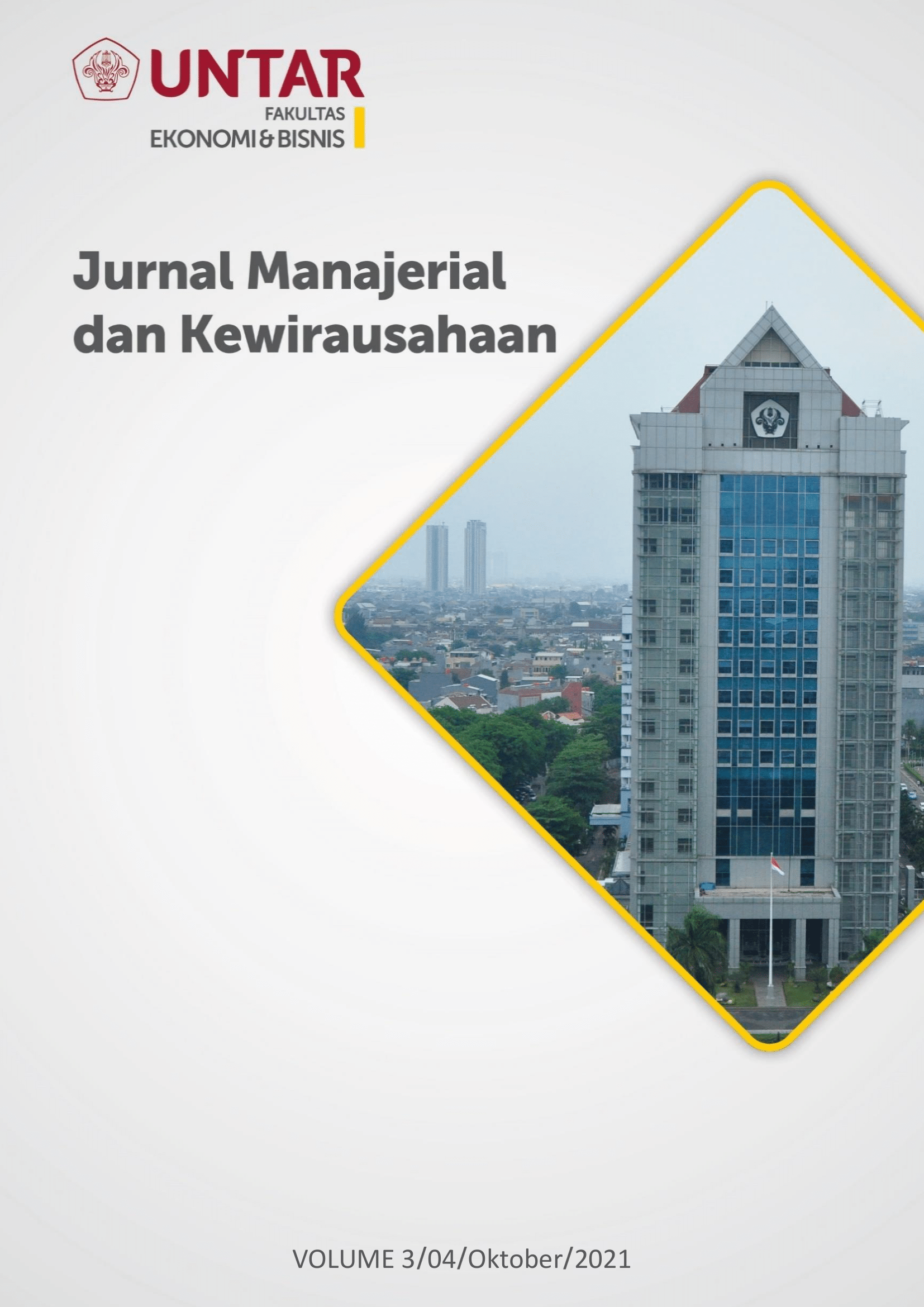Faktor Niat Berwirausaha Pada Mahasiswa Fakultas Ekonomi Di Jakarta Barat
Main Article Content
Abstract
The purpose of this study was to determine the effect of entrepreneurship education, financial support on the entrepreneurial attitudes and entrepreneurial intentions from economics faculty students at private universities in West Jakarta. This study uses the Judgment sampling method. Research respondents were collected from 100 private university students who were previously distributed through an online questionnaire. Data analysis using SEM-PLS. In the results of research, education and financial support have an effect on entrepreneurial attitudes for entrepreneurship. Entrepreneurial attitude has an effect on entrepreneurial intentions.
Tujuan penelitian ini adalah mengetahui adanya pengaruh dari pendidikan kewirausahaan, dukungan finansial kepada sikap kewirausahaan dan niat berwirausaha dari mahasiswa dan mahasiswi fakultas ekonomi pada perguruan tinggi swasta di Jakarta barat. Penelitian menggunakan metode Judgement sampling. Responden penelitian terkumpul dari 100 mahasiswa perguruan tinggi swasta yang sebelumnya disebarkan melalui kuisioner Online. Analisis data menggunakan SEM-PLS. Pada hasil penelitian pendidikan dan dukungan finansial berpengaruh pada sikap kewirausahaan untuk berwirausaha. Sikap kewirausahaan berpengaruh pada niat kewirausahaan.
Article Details
Section
This work is licensed under a Jurnal Muara Ilmu Ekonomi dan Bisnis Creative Commons Attribution-ShareAlike 4.0 International License.,/p>
References
Acs, Z. J., Estrin, S., Mickiewicz, T. dan Szerb, L. (2018). Entrepreneurship, institutional economics and economic growth: an ecosystem perspective. Small Business Economics, 51(2): 501-514. https://doi.org/10.1007/s11187-018-0013-9
Arranz, N., Arroyabe, M. F., dan Fdez. de Arroyabe, J. C. (2019). Entrepreneurial intention and obstacles of undergraduate students: the case of the universities of Andalusia. Studies in Higher Education, 44(11), 2011-2024. https://doi.org/10.1080/03075079.2018.1486812
Bellavitis, C., Filatotchev, I., Kamuriwo, D. S., dan Vanacker, T. (2017). Entrepreneurial finance: new frontiers of research and practice. Venture Capital, 19(1-2), 1–16. https://doi.org/10.1080/13691066.2016.1259733
Botsaris, C., dan Vamvaka, V. (2016). Attitude Toward Entrepreneurship: Structure, Prediction from Behavioral Beliefs, and Relation to Entrepreneurial Intention. Journal of the Knowledge Economy, 7(2), 433–460. https://doi.org/10.1007/s13132-014-0227-2
BPS. (2020). BPS: 270,20 juta Penduduk Indonesia Hasil SP2020. Diakses dari: https://www.bps.go.id/news/2021/01/21/405/bps--270-20-juta-penduduk-indonesiahasil-sp2020.html Pada 23/03/2021.
Do, B.R. dan Dadvari, A. (2017). The influence of the dark triad on the relationship between entrepreneurial attitude orientation and entrepreneurial intention: a study among students in Taiwan university. Asia Pacific Management Review, 22(4), 185-191. https://doi.org/10.1016/j.apmrv.2017.07.011
Etikan, I., Musa, S. A., dan Alkassim, R. S. (2016). Comparison of convenience sampling and purposive sampling. American journal of theoretical and applied statistics, 5(1), 1-4.
Hair, J. F., Black, W. C., Babin, B. J. & Anderson, R. E. (2019). Multivariate Data Analysis: A Global Perspective. Hampshire: Cengage Learning EMEA.
Hansfel, L., dan Puspitowati, I. (2020). Pengaruh Attitude, Subjective Norm dan Perceived Behavior Control terhadap Entrepreneurial Intention. Jurnal Manajerial dan Kewirausahaan, 2(4): 985-993.
Hassan, H., Sade, A. B., dan Rahman, M. S. (2020). Shaping entrepreneurial intention among youngsters in Malaysia. Journal of Humanities and Applied Social Sciences, 2(3), 235-251.
Hisrich, R. D., Peters, M. P. dan Shepherd D. A. (2017). Entrepreneurship. New York: Mc. Graw-Hill Education.
Hsiung, T. (2018). Satisfaction with entrepreneurial education and entrepreneurial intention: The moderating role of internal locus of control. International Journal of Education and Research, 6(4), 139-146.
Kim, M. dan Park, M.J. (2019). Entrepreneurial education program motivations in shaping engineering students’ entrepreneurial intention: The mediating effect of assimilation and accommodation. Journal of Entrepreneurship in Emerging Economies, 11(30), 328-350. https://doi.org/10.1108/JEEE-08-2018-0082
Masango, S.G. dan Lassalle, P. (2020). What entrepreneurs do? Entrepreneurial action guided by entrepreneurial opportunities and entrepreneurial learning in early internationalizing firms. International Marketing Review, 37(6), 1083-1119. https://doi.org/10.1108/IMR10-2018-0273
Monica, D., dan Wijaya, A. (2021). Pengaruh Close Environmental Factors Terhadap Entrepreneurial Intentions Dimediasi Oleh Individual Entrepreneurial Orientation. Jurnal Manajerial dan Kewirausahaan, 3(2), 335-344.
Potishuk, V., dan Kratzer, J. (2017). Factors affecting entrepreneurial intentions and entrepreneurial attitudes in higher education. Journal of Entrepreneurship Education, 20(1), 25-44.
Raza, A., Muffatto, M. dan Saeed, S. (2018). The influence of formal institutions on the relationship between entrepreneurial readiness and entrepreneurial behaviour: A crosscountry analysis. Journal of Small Business and Enterprise Development, 26(1), 133-157. https://doi.org/10.1108/JSBED-01-2018-0014
Thompson, E. R. (2009). Individual entrepreneurial intent: construct clarification and development of an internationally reliable metric. Entrepreneurship. Theory and Practice, 33(3), 669-694. https://doi.org/10.1111%2Fj.1540-6520.2009.00321.x

